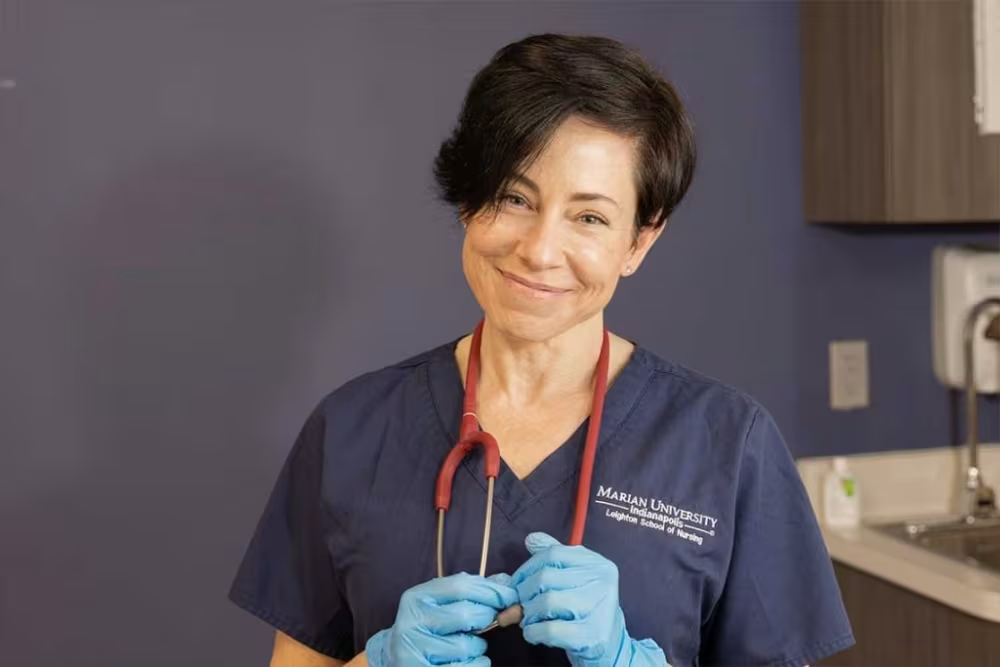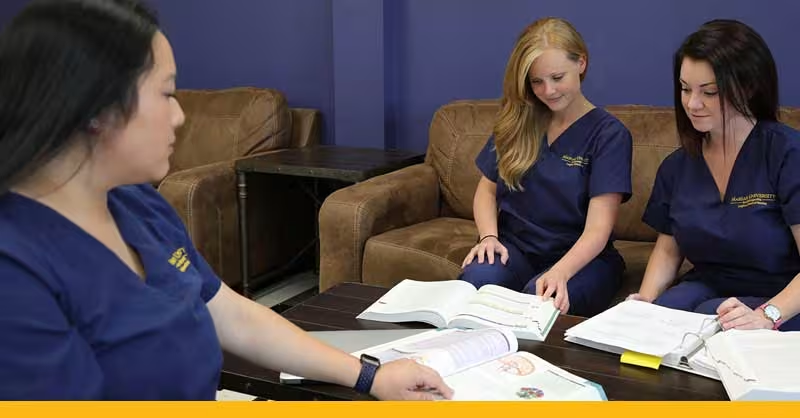Nursing Resume Tips: 6 Ways to Stand Out
Each blog post is dated and contains accurate information as of that date. Certain information may have changed since the blog post publication date. If you would like to confirm the current accuracy of blog information, please visit our ABSN overview page or contact admissions at 866.892.6463.
Standing out as a nursing candidate requires crafting a compelling resume. Some top nursing resume tips from Marian ABSN include highlighting clinical nursing experience and skills, crafting your resume to suit each role and stand out to applicant tracking systems, and emphasizing any certifications.

The nursing profession today is a rewarding field, with growing demand for skilled nurses across a majority of practice areas. Recently licensed nurses will compete with fellow new nurses to land positions with desirable employers, so it’s important to make sure that your resume is as well-crafted as possible to stand apart from the pack. The first important element of your nursing job search is to make sure you have graduated and attained licensure, and Marian University’s Accelerated Bachelor of Science in Nursing program offers a path to a bachelor’s degree in as few as 16 months (significantly faster than a traditional four-year undergraduate degree program).
When applying to a nursing position, your resume is the first impression you will make on a prospective employer. With this in mind, formatting your resume in a way that stands out is vital to getting an interview and forming a favorable impression before you have even met your interviewer. How can you know what to put on a nursing resume, and what are some nursing resume tips to make your application stand apart? In this post, we will explore how to craft your resume and give you the necessary tool to stand apart from graduation and onward throughout your career. Let’s begin.
1. Highlight Clinical Nursing Experience
Any hiring manager in the nursing field wants to ensure that whoever they hire has had a wealth of clinical nursing experience. As a Marian ABSN student, you will complete clinical rotations at top area healthcare facilities in the Indianapolis and Nashville areas. You will gain experience working with real-world patients under supervision, and across an array of practice areas.

When writing your nursing resume, list the organization you completed clinical rotations with and include details like:
- Practice areas you gained experience in
- A rough estimate of the number of patients you regularly cared for on a given day
- Ways in which you improved patient outcomes through your work
Quantifying these experiences can help you stand apart over others who are more general in what they write, and can identify you as a results-focused candidate.
2. Showcase Hard and Soft Nursing Skills
To catch a hiring manager’s eye as a nursing candidate, they should also have a good idea of the nursing skills you are adept in. Skills for a nursing resume include both “hard skills” (technical abilities necessary for the job) and “soft skills” (personality-based skills and traits like communication, compassion and teamwork).
Hard skills in nursing include mastery of critical skills and techniques, and the ability to rapidly assess a situation and take the necessary steps for proper patient care. As a Marian ABSN student, you will complete hands-on nursing skills and simulation labs in mock clinical environments at our program sites. These will provide the foundation you need to succeed in clinicals and in professional nursing practice. Share how you have applied these skills to your clinical rotations, and highlight the soft skills you have also honed during your time as a student. Your references should also be able to attest to these hard and soft nursing skills.

See some of the most important soft nursing skills you can focus on developing as a student.
3. Tailor Your Resume to the Role
While many nurses take on similar roles in patient care, they are separated by practice area and differing employer environments and expectations. Research each position you apply for, and make sure that your resume speaks to the needs of each posting. For instance, if you are applying for a role in a specific practice area that you encountered during clinicals, you will want to focus on that experience as much as possible. If you see a specific mission statement or set of values, speak to how your own motives align with those while touching on relevant soft skills.
4. Optimize for Applicant Tracking Systems
When wondering how to do a nursing resume, one of the more unintuitive elements is needing to optimize and craft your resume to stand out within Applicant Tracking Systems (ATS). Nearly all large employers (and an increasing number of small employers) are using ATS to screen resumes, and if a resume does not pass a check by the ATS it will likely not even be seen by a hiring manager. For this reason, optimizing your resume to suit an ATS check is absolutely vital.
This includes reviewing the job posting in question, identifying keywords and including these aspects in your own resume. Luckily, tailoring a resume for each role is half the battle. You can use online tools to scan your resume and identify areas like formatting that might not be optimal to pass an ATS screen. Check each resume you send out for ATS compliance, and you will be far more likely to have a real human see your resume on the other end.

5. Include Certifications and Continuing Education Efforts
Certain healthcare organizations, like the ones that have attained Magnet status, are associated with higher job satisfaction and better patient outcomes alike. This makes these organizations highly competitive, and any advantage can be the element that lands you an interview (or a job offer).
Nursing offers a huge array of certifications that indicate expertise or commitment to a certain area of practice. These can be required for some nursing roles, but can also serve as a means to impress prospective employers if you have higher than the minimum qualifications. If your goal is to eventually earn a higher degree and pursue an advanced practice or leadership role, mentioning this goal can help to prompt discussions like whether an employer encourages continuing education and if they have a tuition reimbursement program.
See which nursing student associations can put you on the right track to future certifications.

6. Ensure a Professional and Polished Presentation
Lastly, ensure that your resume’s formatting is clean, professional and digestible. Use a simple font throughout, keep the formatting the same across all sections, and double check to ensure that it is free of any grammatical, factual or spelling errors. Keep language clear and concise, and avoid a casual tone. You can ask peers or mentors to review your resume, or upload it to an online writing tool and act on the feedback you get through that source. With a properly formatted resume that speaks to the relevant needs of a position, you can give yourself the best possible chance of landing the role you want.
Strengthen Your Nursing Resume with a Degree Through Marian’s ABSN Program
With so many ways to stand out on your resume, carefully crafting what you write and the ways you format can make the best possible first impression on a prospective employer. Draw on the experience you have gained throughout your nursing education, communicating it through the nursing resume tips we have reviewed above, and you will have a leg up when it comes to landing the right nursing role for you. Contact us today to submit your information, and an admissions advisor will reach out to begin the conversation. Don’t wait to get started on your nursing journey!
